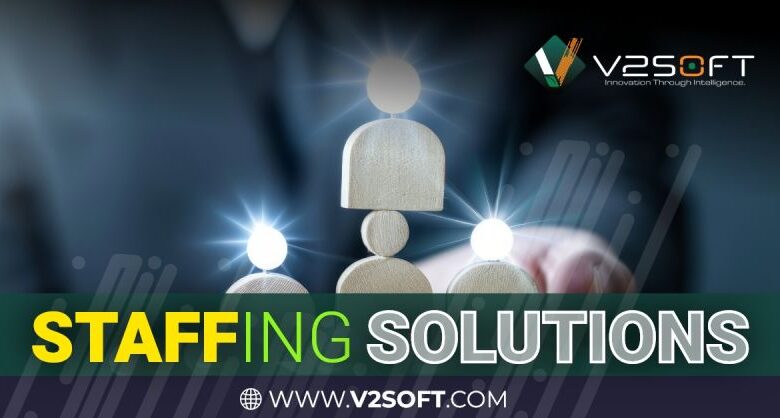Empowering IT Staffing Solutions Amidst AI Challenges and Recruitment Shortages

Introduction
The IT sector experiences rapid changes, and organizations are always in the competition to acquire the best from their preferred talent pool that aligns with their technical needs. Technology has only continued to rise in value, transforming the traditional ways of recruitment and replacing them with new techniques such as IT staffing solutions, AI recruitment software, and contract staffing-specific software. However, most innovations do contain inherent challenges, and the same applies to AI staffing solutions. Shortage of recruitment is one of the reasons why organizations are unable to source the right professional in a timely manner.
This blog delves into how businesses can enable their staffing processes, counter common challenges, and capitalize on workforce solutions from top firms. By learning more about the ins and outs of these tools, businesses can streamline their hiring procedures, mitigate shortages, and enhance the overall output of their operations.
IT Staffing Solutions-An Important Tool
As companies embrace transformation to a fully digital world, IT staffing solutions have become a necessity. Beyond software engineers and cloud architects, the demand is also for cybersecurity experts and data scientists. However, there is a huge skills gap in the sector-resulting in a more or less perpetual shortage of recruitment.
IT staffing solutions bridge that gap by helping companies source people with the right skills more efficiently sooner. Beyond recruitment, full-time employees, or even contract workers through contract staffing software, the solution gives organizations flexibility to scale their workforce up and down in response to project needs.
The companies should consider AI staffing solutions to be able to meet this demand. With automation and learning machines, AI is shortening the recruitment process by automating tiring routine tasks: resume screening, candidate matching, and communication. However, promising as it is, businesses will face challenges in AI staffing solutions, which we shall discuss later.
Challenges in AI Staffing Solutions
Despite much promise that Artificial Intelligence has held for the staffing industry, it also introduces certain challenges that negatively affect its full fruition. Some of the challenges in AI staffing solutions are:
Bias in AI Algorithms: AI systems are only as good as the data they are trained on. In this case, if past hiring data reflects bias, then the AI system will most likely replicate those biases in all the hiring processes that it carries out. This is particularly challenging for IT organizations since the site of innovation is seen in diversity.
Over-reliance on Automation: AI staffing tools can automate most processes, but cannot supplant the judgment of man for assessing a candidate’s cultural fit or potential for growth. Over-reliance on AI will lead to missed opportunities with candidates who don’t perfectly match an algorithm’s criteria.
Integration Challenges: For most firms, integration of AI-powered staffing solutions into an already existing HR system will prove challenging. Since this may create delays and limit the impact AI would otherwise bring to the table, companies have a tough way ahead.
Even so, in empowering the staffing process, companies can leverage AI with human oversight, and this combination allows for achieving greater efficiency in hiring without compromising the quality or integrity of recruitment.
Empowering Staffing: Efficiency and Quality Improvement
Empowerment staffing is the primary business key toward battling recruitment shortages while maximizing AI’s potential. It therefore requires the strategic use of advanced tools, training, and methodologies to power up staffing processes so that HR departments can perform at their highest levels of service.
Empowerment staffing means:
Up-skilling HR Teams: Ensure your HR personnel are capable of using AI, data analytics, and other advanced technology properly.
Use AI to automate routine and time-consuming tasks, so HR professionals can spend more time on strategic, high-touch interactions with candidates. Candidate-centered strategies: use your recruitment process not only for finding talent but also in a way that is positive and good for the experiences of candidates, thus attracting more top professionals.
This way, empowerment-based staffing helps organizations transform some of the purported AI weaknesses into strengths. It ensures a more holistic and effective recruitment process in this regard.
Contract Staffing Software for Overcoming Recruitment Shortfalls
Recruitment shortages become critical in most industries today. The shortfall, however, is a significant problem in the IT sector, and projects will have to wait longer to be accomplished, or some employees will find more work than they can handle. Therefore, companies must soon resolve this pressing issue and do it efficiently.
One of the best means to combat recruitment deficits is through the usage of contract staffing software. It enables businesses to have better management over contingent and temporary workers, access flexible resources that can be scaled up or down to serve the needs of a project.
Benefits of Using Contract Staffing Software
Contract staffing software provides several benefits that include:
Streamlined hiring, which will quickly identify and onboard the contract worker for a project.
Automated Compliance: Ensure that all employees have reached the required legal and regulatory level without additional administrative burden.
Flexible Workforce Management: Scale up or down the workforce with changes in project scope or even market conditions.
By implementing contract staffing software, recruitment shortages are addressed while keeping the flexibility of these staffing solutions.
The Role of Workforce Solutions Companies
Workforce solution companies play a great role in supporting businesses overcome staffing challenges, especially in the IT sector. These companies offer services customized from IT staffing solutions to managing contingent workforces through contract staffing software. Organizations can enjoy the following by forming a relationship with a workforce solutions company.
Access to a Much-Larger Talent Pool. RPO firms have huge pools of prescreened candidates, which makes it much faster to find the talent needed.
Expert Recruitment Knowledge.
These firms specialize in matching talent for your very specific needs-both saves time and makes bad hire impossible.
Scalable Solutions Whether a company needs an assignment of permanent workers or just temporary staff, workforce solutions companies offer flexible hiring models that can be turned towards scaling with business needs.
For companies experiencing recruitment shortages or the complexity of integrating AI, working with a workforce solutions company can tap into the expertise and resources needed to work through these problems.
Conclusion
In the dynamic world of recruitment, businesses would look towards advanced IT staffing solutions and embrace AI while being aware of the challenges ahead. It is through a balanced approach in implementing AI, empowering HR teams and enhancing efficiency, that businesses will successfully overcome the challenges behind AI staffing solutions. Moreover, the resolution of recruitment shortages due to contract staffing software and collaboration with workforce solutions companies will create a flexible, robust hiring process.
Implementing these strategies positions companies to better access top IT talent and retain them, for ensuring future success in an increasingly competitive, technology-driven landscape.




